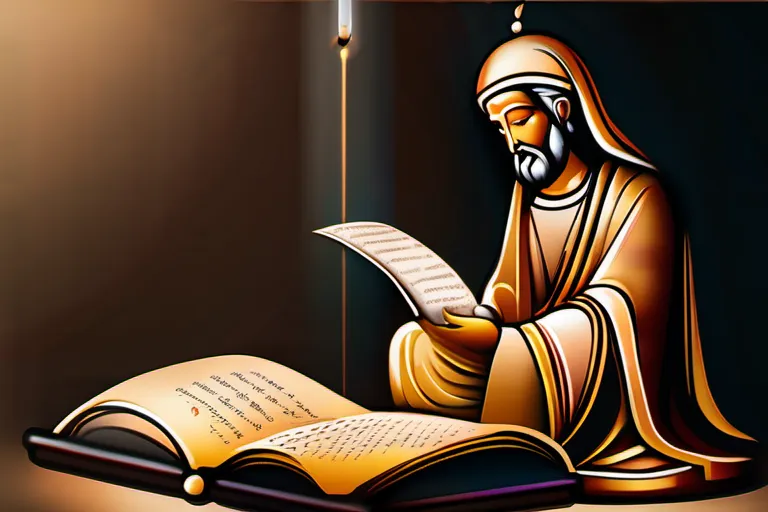Explore the reasons behind religious rules, their significance, and how they shape faith and society.
Religions have a set of rules that guide their followers. But why do religions have these rules? This article delves into the purpose and importance of religious rules, shedding light on their role in shaping faith and society.
The Historical Roots of Religious Rules
The historical roots of religious rules stretch back into antiquity, weaving through time like a complex tapestry that has shaped countless lives and societies. Imagine these rules as ancient seeds sown in fertile soil, growing into towering trees that provide shade, shelter, and sustenance to those who follow them.
Let’s take a closer look at the origins of religious rules by tracing their roots back to some of humanity’s earliest civilizations. In ancient Egypt, for instance, religious practices were intricately tied to the pharaohs’ rule, with temples serving as centers where gods and humans interacted. The Moshytemi or priests played a crucial role in maintaining order by interpreting divine will through rituals and offerings. These practices were not just about personal belief but also about ensuring social harmony and stability.
Similarly, in the Hebrew tradition, the Torah emerged as a guidebook that defined moral and legal boundaries, setting the stage for what would later become Judaism. Each commandment or law within the Torah was not just a set of rules but a framework to live by, ensuring that followers remained connected to their faith and community.
In Hinduism, too, the ancient texts like the Rigveda laid down principles that governed life from daily actions to social interactions. These rules, known as dharma, were meant to uphold cosmic order and maintain societal balance. By adhering to these rules, individuals sought not only personal salvation but also contributed positively to their community.
The origins of religious rules are thus deeply intertwined with the development of human civilizations, serving as a bridge between spiritual belief and practical living. They offer a lens through which we can understand how faith has influenced every aspect of societal structure and individual behavior throughout history. As we delve deeper into these ancient texts, it becomes clear that the purpose of these rules extends far beyond mere regulation; they are essential tools for shaping both personal conduct and collective identity.
The Role of Religious Rules in Shaping Faith
How do religious rules come to shape our understanding of the divine and our relationship with it? Is there more to these guidelines than simply adhering to a set of instructions? Let’s delve into this question by exploring how religious rules define and strengthen the beliefs of followers.
Think about your favorite recipe. The ingredients, measurements, and steps are all crucial for achieving that perfect dish. Similarly, religious rules act as a recipe for spiritual life. They provide the structure, the framework within which believers can understand their faith more deeply and practice it meaningfully.
- Defining Beliefs:
- In many religions, specific rituals or commandments are outlined in sacred texts like the Bible, Quran, or Torah. These rules serve as a mirror, reflecting back to believers their relationship with the divine and the expectations of their faith.
Imagine walking through a dense forest without a map. You might get lost, confused, or even frightened. Religious rules act like a well-mapped path, guiding followers through life’s complexities towards a clearer understanding of their purpose and destiny.
- Strengthening Relationships:
- By following these rules, believers often feel a stronger connection to their community and the divine. Rules that govern behavior, like charity or humility, foster not only personal growth but also social cohesion within faith communities.
Moreover, religious rules can be seen as a form of discipline, much like how training helps athletes perform better. Just as an athlete must follow strict routines to improve their skills, followers of a religion might engage in specific practices or observances to deepen their spiritual lives and align themselves more closely with the divine.
So, why do religious rules matter? They are not just about compliance; they are tools for transformation, for shaping our beliefs and actions. Through these guidelines, we navigate the complexities of life with a greater sense of purpose and direction, much like following a tried-and-true map through uncharted territory.
By examining how religious rules define and strengthen faith, we begin to see their profound impact on both individual spirituality and societal values. It is this interplay between personal belief and communal practice that makes understanding the role of religious rules so essential in comprehending the depth and breadth of human spiritual experience.
The Cultural Significance of Religious Rules
Imagine religion as a vast landscape, rich with ancient trails and vibrant traditions that have been trodden for centuries. These pathways are often marked by rules, which act like signposts guiding believers through their spiritual journey. But what do these rules really mean in the context of culture?
‘Do not worship idols, for they cannot see or hear,’ warns one ancient text. What does this mean beyond mere prohibitions?’
These rules, like the customs and traditions that surround them, reflect the values and beliefs of the communities that have adopted them. They shape how people interact with each other and with their environment, making religion more than just a set of personal beliefs—it becomes a collective identity.
- Rules about dietary laws or dress codes are not merely restrictions; they symbolize respect for the divine and often serve to distinguish one community from another. Just as a unique accent can define a region, so too do these cultural markers set boundaries and maintain cohesion within a religious group.
- The practice of charity and giving is another example. Not only does it reflect a deep-seated value of generosity, but it also strengthens social bonds and fosters a sense of community among believers.
Moreover, these rules are dynamic, evolving over time to adapt to new contexts while still maintaining their core meaning. They serve as a bridge between the past and the present, connecting generations through shared practices and beliefs.
‘If a religion is static, it loses its relevance,’ some might argue. ‘But if too flexible, it risks losing its essence.’
Thus, understanding the cultural significance of religious rules means recognizing their role in shaping not only personal faith but also the broader tapestry of society. They are more than just commandments; they are the threads that weave together a vibrant, complex fabric of human experience.
The Spiritual Implications of Religious Rules
The Spiritual Implications of Religious Rules: Delve into the spiritual aspects of religious rules, exploring their role in guiding followers towards enlightenment, self-improvement, and a deeper connection with the divine.
Imagine walking through a dense forest on a misty morning. The path is narrow, winding, and often unclear, yet it’s this very uncertainty that beckons you forward. Religious rules can be seen as that winding path, guiding souls through the vast and sometimes confusing landscape of spirituality. But why do these rules exist? What purpose do they serve beyond mere tradition?
Consider the metaphor of a lighthouse in the night. These religious rules act much like a lighthouse, casting light on the moral and ethical paths that one should follow. They provide clarity in times of darkness, offering direction and meaning to those seeking spiritual fulfillment. In this way, these rules are not merely constraints but essential guides that lead believers towards their ultimate goals.
Moreover, religious rules can be seen as tools for self-improvement. Just as a gardener prunes a plant to help it grow stronger and healthier, religious practices like prayer, fasting, or meditation serve as spiritual “pruning shears.” They help individuals cut away the excesses that cloud their minds and hearts, allowing them to focus on what truly matters in life.
But perhaps most importantly, these rules are a means of fostering a deeper connection with the divine. Just as a key opens a door leading into an unexplored room, religious rituals and practices can unlock doors to experiences that words cannot describe. They provide a bridge between our human existence and the spiritual realm, enabling us to feel closer to something greater than ourselves.
So, in contemplating these rules, we must ask: What is the ultimate goal of following them? Are they merely empty traditions, or do they hold profound significance for those who embrace them?
The Evolution of Religious Rules Over Time
The evolution of religious rules over time is like watching a living, breathing organism adapt to its environment. From ancient civilizations to modern societies, these guidelines have transformed, yet remained ever-present in shaping our understanding of faith and ethics.
Imagine if you will, the early days when rituals were simple, almost primitive, centered around natural phenomena like sunrises or seasonal changes. These rituals served a dual purpose: to honor the divine and ensure the favor of deities in daily life. Over time, as societies grew more complex, so did these rules. They began to encompass not just worship but also social norms, moral codes, and governance.
Consider how the ten commandments, originating from ancient Israelite traditions, have evolved through centuries of interpretation and application across different cultures and religions. From their initial form as a series of basic prohibitions and commands to guide personal conduct, they have been adapted in various ways. Some societies emphasize them as a legal framework, while others see them more as spiritual guidelines for inner peace.
As we move through history, religious rules have faced significant challenges. The rise of science, the spread of secularism, and the increasing diversity of beliefs have all tested their relevance. In many cases, these rules have undergone reinterpretation to remain pertinent in changing times. For instance, Judaism, which once saw itself as a strict legalistic framework, now emphasizes spiritual growth and ethical living over rigid observance.
Similarly, Christianity’s commandments have been reinterpreted through the ages to address contemporary issues like human rights, environmental stewardship, and social justice. The Bible, once a text primarily concerned with ancient Israelite history and law, is now read in ways that speak to modern concerns about inequality and compassion.
The adaptability of religious rules is a testament to their enduring value. They have the ability to evolve while maintaining core principles, ensuring relevance without losing their spiritual essence. As we continue to navigate an increasingly complex world, these evolving guidelines provide a framework for ethical living, community building, and finding meaning in our lives.
The Controversies Surrounding Religious Rules
The Controversies Surrounding Religious Rules: Explore the debates and controversies that arise when religious rules clash with modern values, cultural shifts, or individual beliefs.
Have you ever wondered why some religious rules cause such heated debates in today’s society? It’s a complex interplay of historical context, evolving societal norms, and personal convictions. Imagine if your favorite book suddenly had new chapters added that contradicted its original message; how would you react?
- Adaptation vs. Dogma: How do religious communities balance the need for flexibility with maintaining strict adherence to traditional rules? The answer isn’t always clear.
- Cultural Shifts: In a world where cultures are merging and evolving at an unprecedented pace, how can ancient laws remain relevant without becoming outdated?
- Personal Beliefs vs. Community Standards: When individual interpretations clash with community practices, who gets to decide what’s right? It’s like trying to navigate through a maze of opinions and beliefs.
The controversies surrounding religious rules often highlight the tension between tradition and modernity. For instance, consider the debate over women’s roles in worship or the use of technology during religious services. These issues aren’t just about following a set of rules; they’re reflections of broader societal changes.
Are these controversies necessary for growth and understanding within religions? They certainly challenge us to re-evaluate our practices and beliefs. Perhaps, in the process, we can find new ways to connect with each other, despite our differences.
The ongoing debates also serve as a reminder of the dynamic nature of religious rules. While some may resist change, others see it as an opportunity for spiritual renewal. In this sense, these controversies are not just about winning arguments but fostering dialogue and mutual respect within diverse communities.
Conclusion
 Understanding the reasons behind religious rules can foster a deeper appreciation for the faiths they govern. By examining their historical context, cultural significance, and spiritual implications, we gain valuable insights into the human experience.
Understanding the reasons behind religious rules can foster a deeper appreciation for the faiths they govern. By examining their historical context, cultural significance, and spiritual implications, we gain valuable insights into the human experience.











